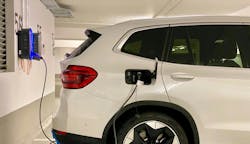ComEd and Illinois College of Optometry Deploy EV Chargers for Low-Income Communities as Part of DOE Pilot Program
ComEd has joined the Illinois College of Optometry (ICO) and members of the Bronzeville, Illinois, community to commission EV charging stations as part of a US Department of Energy (DOE) pilot launched on the city’s South Side to improve EV charging access for communities with limited access.
The pilot adds five new EV charging stations in Bronzeville, including a curbside charging station. Curbside charging will play an important role in EV adoption in densely populated areas with limited access to EV charging and fewer parking lots to accommodate public charging infrastructure.
The $3 million project, which includes DOE grant funding and ComEd matching funds, is part of a larger study conducted by national partners, including the Center for Sustainable Energy, to bring charging to more low-income communities with a higher concentration of greenhouse gas emissions. The five Bronzeville chargers installed throughout the community have already served nearly 300 unique drivers and more than 2,800 charging sessions.
“The dangerous effects of air pollution and the burdens of asthma continue to weigh more heavily on lower-income communities, but the clean energy transition has the potential to alleviate those health risks,” said Brian Urbaszewski, Director of Environmental Health Programs at Respiratory Health Association. “The installation of publicly available EV chargers is one way ComEd is making owning a clean, zero-emission vehicle more affordable where the health benefits are most needed.”
Illinois aims to add 1 million EVs to the road by 2030, as outlined in the Climate and Equitable Jobs Act (CEJA). The chargers are strategically placed throughout the Bronzeville community to support individuals living in multi-unit dwellings (MUDs), including apartment complexes and condominium buildings. The chargers located at ICO are also available for members of the community to use.
According to National research, 80% of EV charging is conducted at private residences, and only 5% of home charging is found at MUDs. More MUD charging is required, as nearly one-third of residences in the US are multi-unit dwellings with five units or more.
Recently, ComEd launched nearly $90 million in rebates, with a significant level of funding reserved to help expand the network of charging in the region, with a special focus on low-income communities and those historically most affected by pollution. More than half of the funding is reserved to help strengthen EV investment in equity-eligible communities, with higher levels of rebates reserved for customers located in low-income and equity-eligible communities.
Residential customers can apply for rebates of up to $3,750 to offset the costs of purchasing and installing residential Level 2 chargers. For building managers of MUDs, business sector rebates ranging from $8,000-$80,000 are available to offset the cost of infrastructure serving Level 2 EV chargers and up to $500,000 for infrastructure serving DC Fast Chargers.
“ComEd is committed to supporting a clean energy future in northern Illinois, and increasing charging access for our customers is a key component to greater EV adoption,” said Melissa Washington, SVP of Customer Operations and Strategy at ComEd. “The air quality and sustainability benefits of EVs are vast, but we know that financial barriers and access to charging can be challenging. That is why programs like this charging pilot are so impactful in not only supporting air quality, but ensuring equitable access to this critical technology.”
About the Author
EnergyTech Staff
Rod Walton is head of content for EnergyTech.com. He has spent 17 years covering the energy industry as a newspaper and trade journalist.
Walton formerly was energy writer and business editor at the Tulsa World. Later, he spent six years covering the electricity power sector for Pennwell and Clarion Events. He joined Endeavor and EnergyTech in November 2021.
He can be reached at [email protected].
EnergyTech is focused on the mission critical and large-scale energy users and their sustainability and resiliency goals. These include the commercial and industrial sectors, as well as the military, universities, data centers and microgrids.
Many large-scale energy users such as Fortune 500 companies, and mission-critical users such as military bases, universities, healthcare facilities, public safety and data centers, shifting their energy priorities to reach net-zero carbon goals within the coming decades. These include plans for renewable energy power purchase agreements, but also on-site resiliency projects such as microgrids, combined heat and power, rooftop solar, energy storage, digitalization and building efficiency upgrades.
